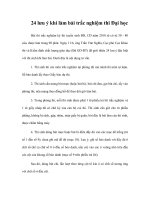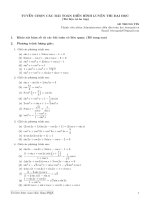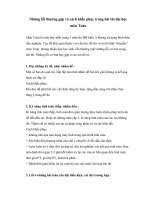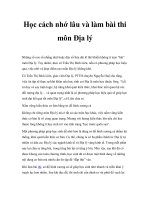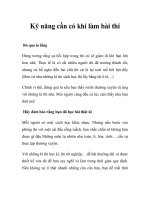FCE (Bài thi FCE - Reading).PDF
Bạn đang xem bản rút gọn của tài liệu. Xem và tải ngay bản đầy đủ của tài liệu tại đây (427.44 KB, 5 trang )
10
fce examination | paper 1: reading – sample paper
2
0102/1 Jun03
Part 1
You are going to read a magazine article about an orchestra. Choose the most suitable heading from
the list A-I for each part (1- 7) of the article. There is one extra heading which you do not need to use.
There is an example at the beginning (0).
Mark your answers on the separate answer sheet.
A Not as silly as it sounds
B Not the original intention
C Responding to a demand
D A great discovery for many
E Leading to new ambitions
F Modest origins
G Great dedication
H Nobody is excluded
I The orchestra you can join straight away
PAPER 1: READING
Part 1 (Questions 1–7)
11
fce examination | paper 1: reading – sample paper
4
0102/1 Jun03
Part 2
You are going to read an extract from a novel. For questions 8-15, choose the answer (A, B, C or D)
which you think fits best according to the text.
Mark your answers on the separate answer sheet.
There was a small breeze when Christine came out for her lunch as she usually did,
even when it was raining, instead of going up to the store canteen. You could never get
a table to yourself there, and whoever sat with you always wanted to complain about
the shop, the customers, the management or the canteen food. Everyone at Goldwyn’s
seemed to have a complaint of some kind, although it was one of the best London
stores to work for, and many of the staff had been there for years – some of them were
long past retiring age. This was because the management let them stay on even when
they were really past it, like poor old Martha, who was always trying to sell people
dresses that were much too old for them.
Christine herself had been in the book department for more than four years. She had
started as a junior, knocking over piles of books and breaking the till once a week in her
efforts to serve customers quickly. Now she was Head Salesperson and moved calmly
around the department between the bright new paperbacks, knowing that book
customers liked to take their time, unlike the people who stampeded through the other
parts of the shop with never a moment to spare.
She knew every book in the place, and all about the new ones before they came out.
She was said to be Mr Parker’s right-hand person – and heaven knows he needed one –
and was sometimes asked into his office to meet a favoured publisher’s representative.
The book department, partly due to Mr Parker’s weak administration and partly
because it was thought to be sophisticated, was the only department in Goldwyn’s
where you did not have to wear black. This led to some confusion as to who was an
assistant and who was a customer, not untypical of bookshops, and accounted for the
distressed look of people who picked up a book they wanted but were afraid of having
their elbows grasped by the store detective before they could find someone to take their
money.
Christine was wearing her grey suit today. She liked the grey suit. She had liked it
for a long time, because she had accepted her aunt’s advice that it was better to buy an
expensive suit that would last than to keep buying cheap suits that looked very smart
for a few weeks, until they began to wrinkle at the elbows and sag at the seat. The grey
suit had been what the shop had called a ‘classic’, which meant that nobody would ever
turn round in the street to look at it, but it would stand having its skirt taken up or let
down according to the swings of fashion.
Christine liked her work, as much as one can like any job that imprisons one from
nine till five-thirty. She liked Goldwyn’s, but she was always glad to get away from it
at lunchtime, even though it meant queuing for a table at one of the restaurants and
teashops that fed the local shop-workers. Here people tended to eat with one eye on
their watches and had a taste for things like pasta and puddings which were the most
filling at the least cost. But Christine, once seated, enjoyed a leisurely, if lonely,
sandwich.
Alice, who was her junior, was always meeting people at lunchtime. Even if it was
only a man who had picked up her handkerchief in the cafeteria, she made it sound
exciting, like an adventure. Alice and the other junior, Helen, were always giggling in
the classics section where the customers did not go much. If Christine came along, they
would suddenly look serious and pretend to be straightening books. Christine thought
this should have made her feel very old, but it didn’t. She was so much happier than she
had been at the giggling age. She liked her authority in the book department.
Sometimes, outside, she insecurely wondered how she stood in relation to the rest of
the world. At Goldwyn’s she was someone.
line 14
line 21
5
0102/1 Jun03
[Turn over
8 Christine preferred not to have lunch at work because she wanted to avoid
A her colleagues.
B the canteen food.
C the management.
D the customers.
9 ‘Stampeded’ (line 14) describes a way of
A choosing.
B buying.
C talking.
D moving.
10 Christine was particularly valuable to Mr Parker because
A publishers’ representatives liked her.
B she knew which books would sell.
C she had good relations with customers.
D she had knowledge which he lacked.
11 ‘This’ (line 21) refers to
A the book department.
B a confusing situation.
C the assistants’ free choice of clothes.
D Mr Parker’s attitude to customers.
12 Why did customers in the book department sometimes look uncomfortable?
A It was unlike other bookshops.
B The assistants watched them closely.
C They didn’t know who to pay.
D There were no prices on the books.
13 Which word most accurately describes Christine’s grey suit?
A practical
B fashionable
C original
D inexpensive
14 What was the disadvantage for Christine of the places she went to for lunch?
A the type of food they served
B the fact that they were crowded
C the speed with which she had to eat
D the type of people who ate there
15 How did Christine regard the junior members of staff?
A She found them annoying.
B They made her feel old.
C She found them amusing.
D They made her feel important.
PAPER 1: READING
Part 2 (Questions 8–15)
12
fce examination | paper 1: reading – sample paper
6
0102/1 Jun03
Part 3
You are going to read a newspaper article about a chef who works in the film and TV industries. Seven
sentences have been removed from the article. Choose from the sentences A-H the one which fits
each gap (16-21). There is one extra sentence which you do not need to use. There is an example at
the beginning (0).
Mark your answers on the separate answer sheet.
Cooking for the camera
Colin Capon works as a ‘props chef’. He is
responsible for preparing all the food that
appears on a set during the making of a TV
drama series or a film. His job came about purely
by chance. The BBC phoned to ask if he knew
anyone who could provide food for a film being
shot on location in the east of England. Phone
calls to friends and colleagues proved fruitless.
‘That’s when my wife, Auriel, suggested I should
have a go,’ says Colin. ‘ I spent
many hours in the local library not only learning
all I could about the type of food that was eaten
then, but the etiquette of meals as well.
’
Colin has since worked on many films and TV
series. ‘Some films require a great deal of
research,’ says Colin. ‘It’s important that the food
is as authentic as possible. A hundred years
ago you would never get a bowl of perfect fruit,
for instance.
’
His latest project, a drama set in the 12th century,
was more difficult, as history rarely records what
was eaten then. ‘I had to think around it and
consider how people lived. In
addition, they ate lots of grains, vegetables and
birds such as cranes, swans (we used a stuffed
one on set once) and peacocks. These would be
served with head and legs intact.
‘As well as being historically correct, the food
must also be able to withstand hot studio lights.
I certainly wouldn’t be popular with
the director if I poisoned the leading lady! The
food which is going to be eaten can stay on set
for only a few hours, after which it must be
replaced by fresh. If it
’s there merely for visual
effect, it can stay until it starts to smell, though
actors get fed up with looking at the same food
for three days.
’
Although concerned about realism, Colin
sometimes finds it difficult to find the right
ingredients. ‘ For example, in
medieval times beetroot and parsnips were
eaten with their tops growing. I have to buy
parsnips, then bury them in sand until they are
green! Dandelions and other wild leaves are not
found in the shops and the apples available may
be the wrong colour and shape for the period.
’
Quantities and appearance can often be as big a
headache as ingredients. ‘I often have to
prepare vast quantities so that plates can be
refilled.
‘Working on location means that I get to visit
some beautiful places, which I enjoy, but it also
means having to rely on cooking in unfamiliar
kitchens, which can be a bit of a nightmare,
particularly if I
’m cooking difficult dishes.
During filming I have to work long
hours and it can sometimes be boring when you
have long waits between shots.
’
0H
16
17
18
19
20
21
7
0102/1 Jun03
[Turn over
A With a wedding cake or something like
that, if it is cut before the director is
satisfied I have to go and make it look
untouched.
B Supermarkets stock most things all year
round, but not always in the correct form.
C I never really paid much attention to history
lessons at school and now this is one of
the aspects of the work that I enjoy the
most.
D Without the use of chemicals they
probably looked a bit marked and oddly
shaped.
E Few of them would have had an oven, so
most meat would be cooked over a fire.
F The work is obviously good fun, otherwise
I wouldn’t do it, but it’s perhaps not as
glamorous as people imagine.
G And, if it is actually going to be eaten,
hygiene must be considered.
H The film was set a hundred years ago and
my job was to prepare the food for a
dinner-party scene.
PAPER 1: READING
Part 3 (Questions 16–21)
13
fce examination | paper 1: reading – sample paper
8
0102/1 Jun03
Part 4
You are going to read a magazine article about public speaking. For questions 22-35, choose from the
sections of the article (A-F). The sections may be chosen more than once. When more than one
answer is required, these may be given in any order. There is an example at the beginning (0).
Mark your answers on the separate answer sheet.
Which section(s) of the article mention(s)
not using lengthy written notes?
an action that may cause listeners to lose concentration?
the need to ensure that a talk is at the right level?
the fact that audiences tend to be supportive towards a speaker?
a technique used by well-known entertainers?
unconscious movements that speakers may make?
the need to avoid being dependent on written notes?
the standard structure of a talk?
the physical distance between a speaker and an audience?
imagining yourself as a good speaker?
the personal benefit gained from repeated rehearsals?
the need to be aware of the speed at which a talk is delivered?
the fact that an audience should have a good view?
23
22
24
26
27
28
29
30
31
33
34
35
32
25
0B
9
0102/1 Jun03
Speak easy
Most of us have to speak in front of a crowd of people at some point in our lives.
Here are a few guidelines that will help you address your audience with
confidence.
A We have all sat through somebody
mumbling a series of disconnected
thoughts and wondered when it was
going to end. It is important to
remember how you felt for the person
doing the talk. Most probably, you
sympathised with them and were
relieved for them when they had ‘got
through it’. This is important because
your audience will also want the best
for you. Visualise yourself delivering a
witty, clever and informative
presentation with the audience
hanging on every word.
B ‘Nobody plans to fail, they simply fail
to plan.’ Nowhere is this truer than in
the arena of public speaking. The
classic format for any talk has a
beginning, a middle and an end. Think
about how long you want the talk to
last and plan the content of the talk to
fit the right amount of time. Also, think
about your audience: make sure your
approach to the subject of your talk is
neither too complex nor too simple for
them. If you are going to use prompts,
small cards are quite good as they can
be discreet and relatively unnoticeable
compared to large sheets of paper.
C Wherever possible, make sure you
know the venue of your talk and check
that people can see you and any
slides or diagrams you might be using
to support your points. When talking to
a large group, try to keep very close to
the front row as this creates a feeling
of togetherness. Some of the best
comedians use this closeness to
encourage a feeling of secrecy, telling
you things as a stage whisper in order
to build this intimacy.
D It is important that you stand
comfortably with both feet rooted to
the floor but slightly apart. Without
realising it, there will be a tendency to
‘retreat’ from the audience or you may
sway from side to side. Therefore,
think of ways to counteract this when
rehearsing (e.g. imagine you are
wearing heavy lead shoes on your feet
which are keeping your heels down).
Try not to lean on tables or get your
arms too close to your body as you will
restrict your lungs and impair your
ability to project your voice. Although it
may help you feel more relaxed, try
not to walk about when delivering your
speech as this will be distracting for
your audience.
E As with any skill, practice is vital. The
more you practise, the more confident
you will be. Try not to simply read out
what you have prepared, and picture
yourself talking confidently and
knowledgeably about your subject.
After you have been presenting to the
mirror for a while, you will begin to see
which gestures and facial movements
work and which ones look wrong.
Remember that nobody wants you to
do badly and try to feel positive that
you are going to deliver an interesting
and informative talk.
F Despite the fact that we all feel shy or
nervous about talking to a large group,
the reality in a lot of cases is that, once
we get talking and feeling confident,
we all have the ability to ‘perform’. But
remember to talk in a controlled
manner, as we all have a tendency to
rush once we are in front of a big
crowd. Also, if you are going to be
using a microphone, then practise with
it first. If not, make sure that your voice
can fill the room for the time you are
speaking or reduce the time that you
are going to talk. Breathing exercises
and voice projection techniques will all
help.
PAPER 1: READING
Part 4 (Questions 22–35)
PART ONE
1 F
2 D
3 B
4 H
5 G
6 A
7 E
PART TWO
8 A
9 D
10 D
11 C
12 C
13 A
14 B
15 D
PART THREE
16 D
17 E
18 G
19 B
20 A
21 F
PART FOUR
22 D
23 B
24 A/E
25 E/A
26 C
27 D
28 E
29 B
30 C
31 A/E
32 E/A
33 E
34 F
35 C
14
fce examination | paper 1: reading – answer keys and answer sheet
PAPER 1: READING
Answer keys and answer sheet
